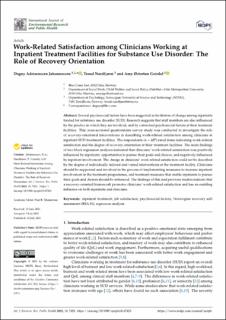| dc.contributor.author | Johannessen, Dagny Adriaenssen | |
| dc.contributor.author | Nordfjærn, Trond | |
| dc.contributor.author | Geirdal, Amy Østertun | |
| dc.coverage.spatial | Norway | en_US |
| dc.date.accessioned | 2021-10-07T10:13:31Z | |
| dc.date.available | 2021-10-07T10:13:31Z | |
| dc.date.created | 2021-07-09T13:59:42Z | |
| dc.date.issued | 2021-07-12 | |
| dc.identifier.citation | International Journal of Environmental Research and Public Health (IJERPH). 2021, 18 (14), 1-14. | en_US |
| dc.identifier.issn | 1660-4601 | |
| dc.identifier.uri | https://hdl.handle.net/11250/2788349 | |
| dc.description.abstract | Several psychosocial factors have been suggested as facilitators of change among inpatients treated for substance use disorder (SUD). Research suggests that staff members are also influenced by the practice in which they are involved, and by contextual psychosocial factors at their treatment facilities. This cross-sectional questionnaire survey study was conducted to investigate the role of recovery-orientated interventions in describing work-related satisfaction among clinicians at inpatient SUD treatment facilities. The respondents (n = 407) rated items indicating work-related satisfaction and the degree of recovery orientation at their treatment facilities. The main findings of two block regression analyses indicated that clinicians’ work-related satisfaction was positively influenced by inpatients’ opportunities to pursue their goals and choices, and negatively influenced by inpatient involvement. The change in clinicians’ work-related satisfaction could not be described by the degree of individually tailored and varied interventions at the treatment facility. Clinicians should be supported and involved in the process of implementing measures to increase inpatient involvement in the treatment programmes, and treatment measures that enable inpatients to pursue their goals and choices should be enhanced. The findings of this and previous studies indicate that a recovery-oriented framework promotes clinicians’ work-related satisfaction and has an enabling influence on both inpatients and clinicians. | en_US |
| dc.description.sponsorship | This study is part of a PhD degree, which is funded by Blue Cross East in Norway. | en_US |
| dc.language.iso | eng | en_US |
| dc.publisher | MDPI | en_US |
| dc.relation.ispartofseries | International Journal of Environmental Research and Public Health (IJERPH);Volume 18 / Issue 14 | |
| dc.rights | Navngivelse 4.0 Internasjonal | * |
| dc.rights.uri | http://creativecommons.org/licenses/by/4.0/deed.no | * |
| dc.subject | Inpatient treatment | en_US |
| dc.subject | Job satisfaction | en_US |
| dc.subject | Psychosocial factors | en_US |
| dc.subject | Norwegian recovery self-assessments | en_US |
| dc.subject | Regression analyses | en_US |
| dc.title | Work-Related Satisfaction among Clinicians Working at Inpatient Treatment Facilities for Substance Use Disorder: The Role of Recovery Orientation | en_US |
| dc.type | Peer reviewed | en_US |
| dc.type | Journal article | en_US |
| dc.description.version | publishedVersion | en_US |
| dc.rights.holder | © 2021 by the authors. | en_US |
| dc.source.articlenumber | 7423 | en_US |
| cristin.ispublished | true | |
| cristin.fulltext | original | |
| cristin.qualitycode | 1 | |
| dc.identifier.doi | https://doi.org/10.3390/ijerph18147423 | |
| dc.identifier.cristin | 1921188 | |
| dc.source.journal | International Journal of Environmental Research and Public Health (IJERPH) | en_US |
| dc.source.volume | 18 | en_US |
| dc.source.issue | 14 | en_US |
| dc.source.pagenumber | 1-14 | en_US |

